Law Society and Controversy
VerifiedAdded on 2023/01/12
|7
|1835
|36
AI Summary
This project report discusses the issue of sex discrimination faced by women in society and the laws implemented in the UK to address it. It explores the various legislations such as the Civil Rights Act, Sex Discrimination Act, Equality Act, and Equal Pay Act, and their impact on women's rights in education, employment, and other areas. The report also highlights important case laws that have shaped the legal understanding of discrimination and equality.
Contribute Materials
Your contribution can guide someone’s learning journey. Share your
documents today.
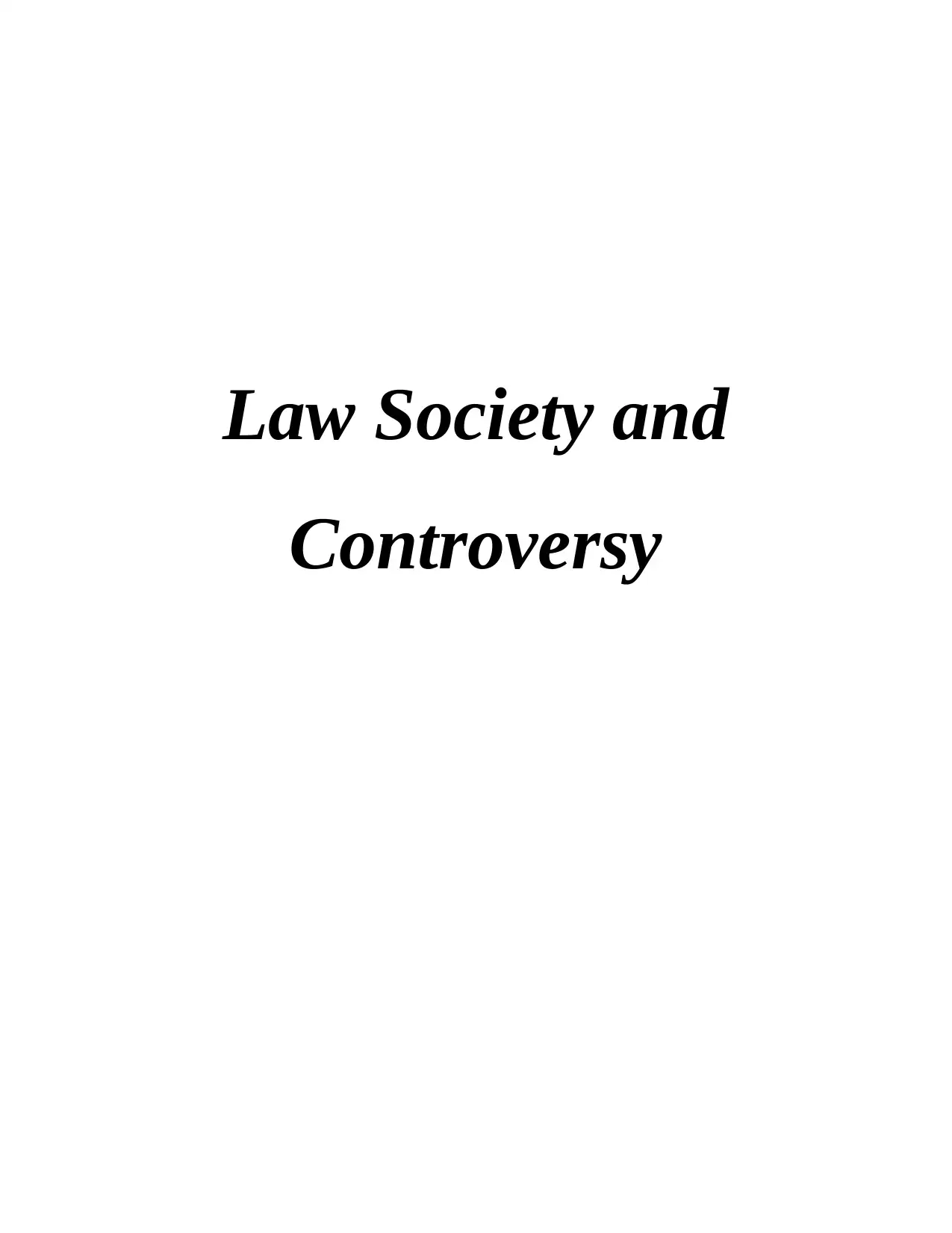
Law Society and
Controversy
Controversy
Secure Best Marks with AI Grader
Need help grading? Try our AI Grader for instant feedback on your assignments.
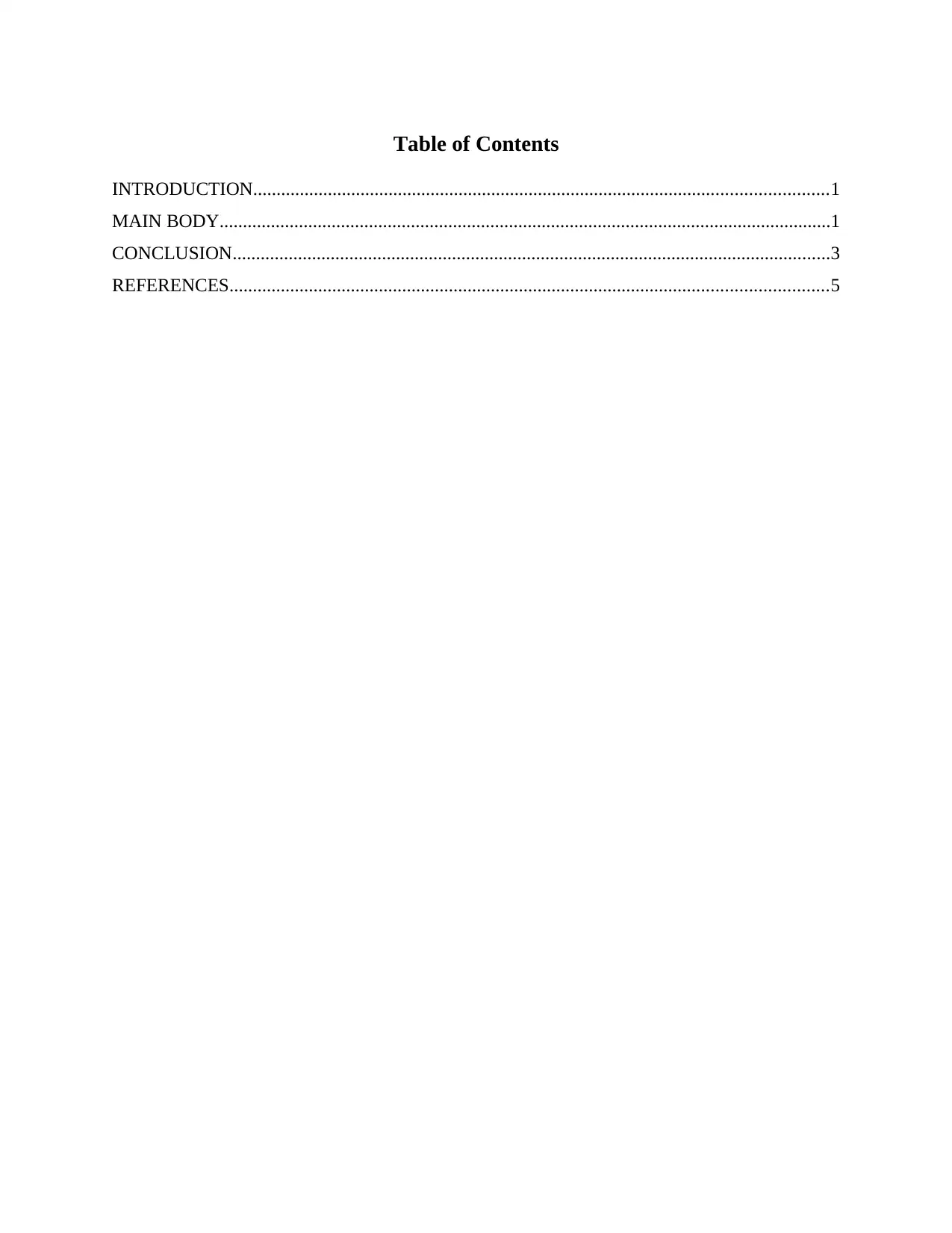
Table of Contents
INTRODUCTION...........................................................................................................................1
MAIN BODY...................................................................................................................................1
CONCLUSION................................................................................................................................3
REFERENCES................................................................................................................................5
INTRODUCTION...........................................................................................................................1
MAIN BODY...................................................................................................................................1
CONCLUSION................................................................................................................................3
REFERENCES................................................................................................................................5
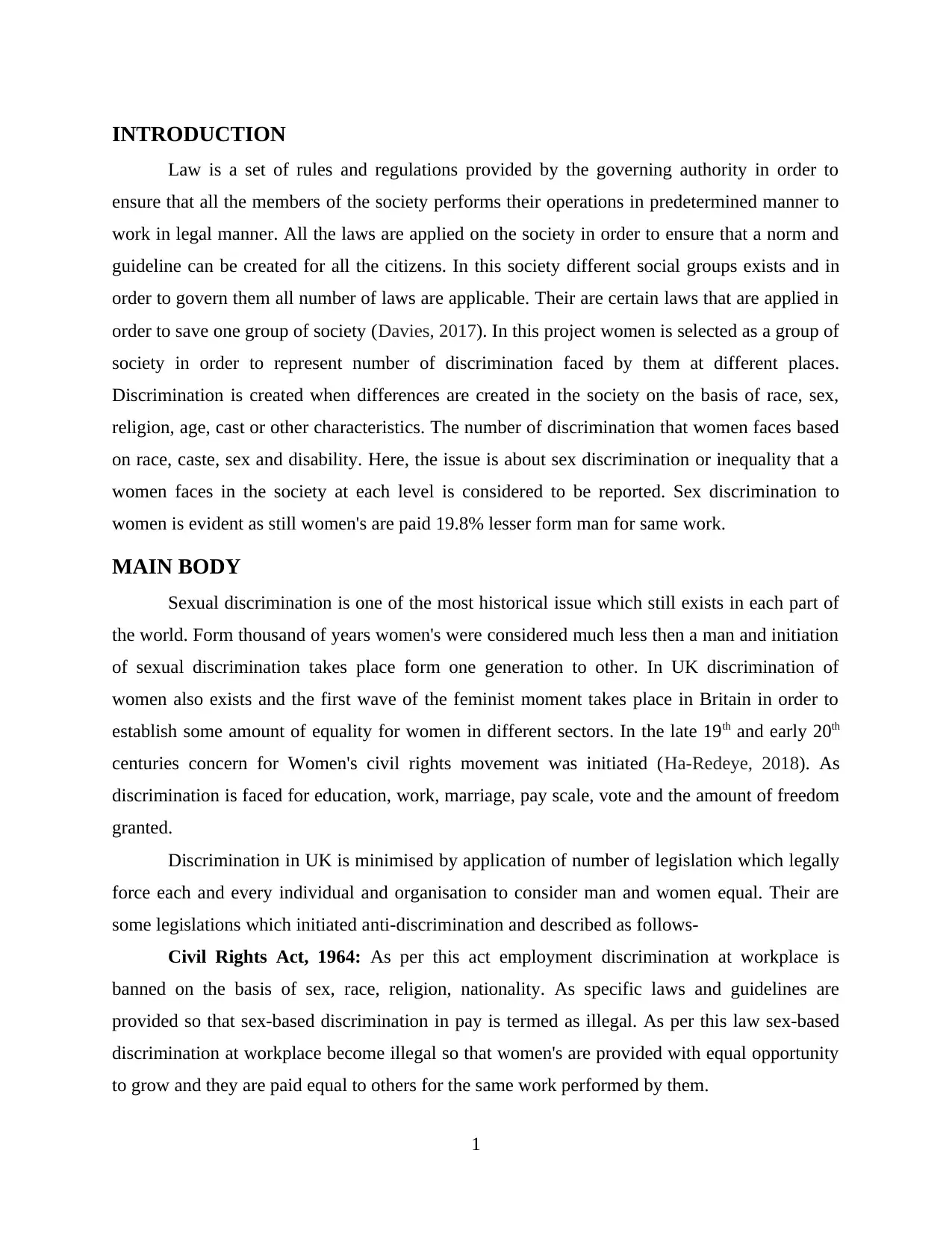
INTRODUCTION
Law is a set of rules and regulations provided by the governing authority in order to
ensure that all the members of the society performs their operations in predetermined manner to
work in legal manner. All the laws are applied on the society in order to ensure that a norm and
guideline can be created for all the citizens. In this society different social groups exists and in
order to govern them all number of laws are applicable. Their are certain laws that are applied in
order to save one group of society (Davies, 2017). In this project women is selected as a group of
society in order to represent number of discrimination faced by them at different places.
Discrimination is created when differences are created in the society on the basis of race, sex,
religion, age, cast or other characteristics. The number of discrimination that women faces based
on race, caste, sex and disability. Here, the issue is about sex discrimination or inequality that a
women faces in the society at each level is considered to be reported. Sex discrimination to
women is evident as still women's are paid 19.8% lesser form man for same work.
MAIN BODY
Sexual discrimination is one of the most historical issue which still exists in each part of
the world. Form thousand of years women's were considered much less then a man and initiation
of sexual discrimination takes place form one generation to other. In UK discrimination of
women also exists and the first wave of the feminist moment takes place in Britain in order to
establish some amount of equality for women in different sectors. In the late 19th and early 20th
centuries concern for Women's civil rights movement was initiated (Ha-Redeye, 2018). As
discrimination is faced for education, work, marriage, pay scale, vote and the amount of freedom
granted.
Discrimination in UK is minimised by application of number of legislation which legally
force each and every individual and organisation to consider man and women equal. Their are
some legislations which initiated anti-discrimination and described as follows-
Civil Rights Act, 1964: As per this act employment discrimination at workplace is
banned on the basis of sex, race, religion, nationality. As specific laws and guidelines are
provided so that sex-based discrimination in pay is termed as illegal. As per this law sex-based
discrimination at workplace become illegal so that women's are provided with equal opportunity
to grow and they are paid equal to others for the same work performed by them.
1
Law is a set of rules and regulations provided by the governing authority in order to
ensure that all the members of the society performs their operations in predetermined manner to
work in legal manner. All the laws are applied on the society in order to ensure that a norm and
guideline can be created for all the citizens. In this society different social groups exists and in
order to govern them all number of laws are applicable. Their are certain laws that are applied in
order to save one group of society (Davies, 2017). In this project women is selected as a group of
society in order to represent number of discrimination faced by them at different places.
Discrimination is created when differences are created in the society on the basis of race, sex,
religion, age, cast or other characteristics. The number of discrimination that women faces based
on race, caste, sex and disability. Here, the issue is about sex discrimination or inequality that a
women faces in the society at each level is considered to be reported. Sex discrimination to
women is evident as still women's are paid 19.8% lesser form man for same work.
MAIN BODY
Sexual discrimination is one of the most historical issue which still exists in each part of
the world. Form thousand of years women's were considered much less then a man and initiation
of sexual discrimination takes place form one generation to other. In UK discrimination of
women also exists and the first wave of the feminist moment takes place in Britain in order to
establish some amount of equality for women in different sectors. In the late 19th and early 20th
centuries concern for Women's civil rights movement was initiated (Ha-Redeye, 2018). As
discrimination is faced for education, work, marriage, pay scale, vote and the amount of freedom
granted.
Discrimination in UK is minimised by application of number of legislation which legally
force each and every individual and organisation to consider man and women equal. Their are
some legislations which initiated anti-discrimination and described as follows-
Civil Rights Act, 1964: As per this act employment discrimination at workplace is
banned on the basis of sex, race, religion, nationality. As specific laws and guidelines are
provided so that sex-based discrimination in pay is termed as illegal. As per this law sex-based
discrimination at workplace become illegal so that women's are provided with equal opportunity
to grow and they are paid equal to others for the same work performed by them.
1
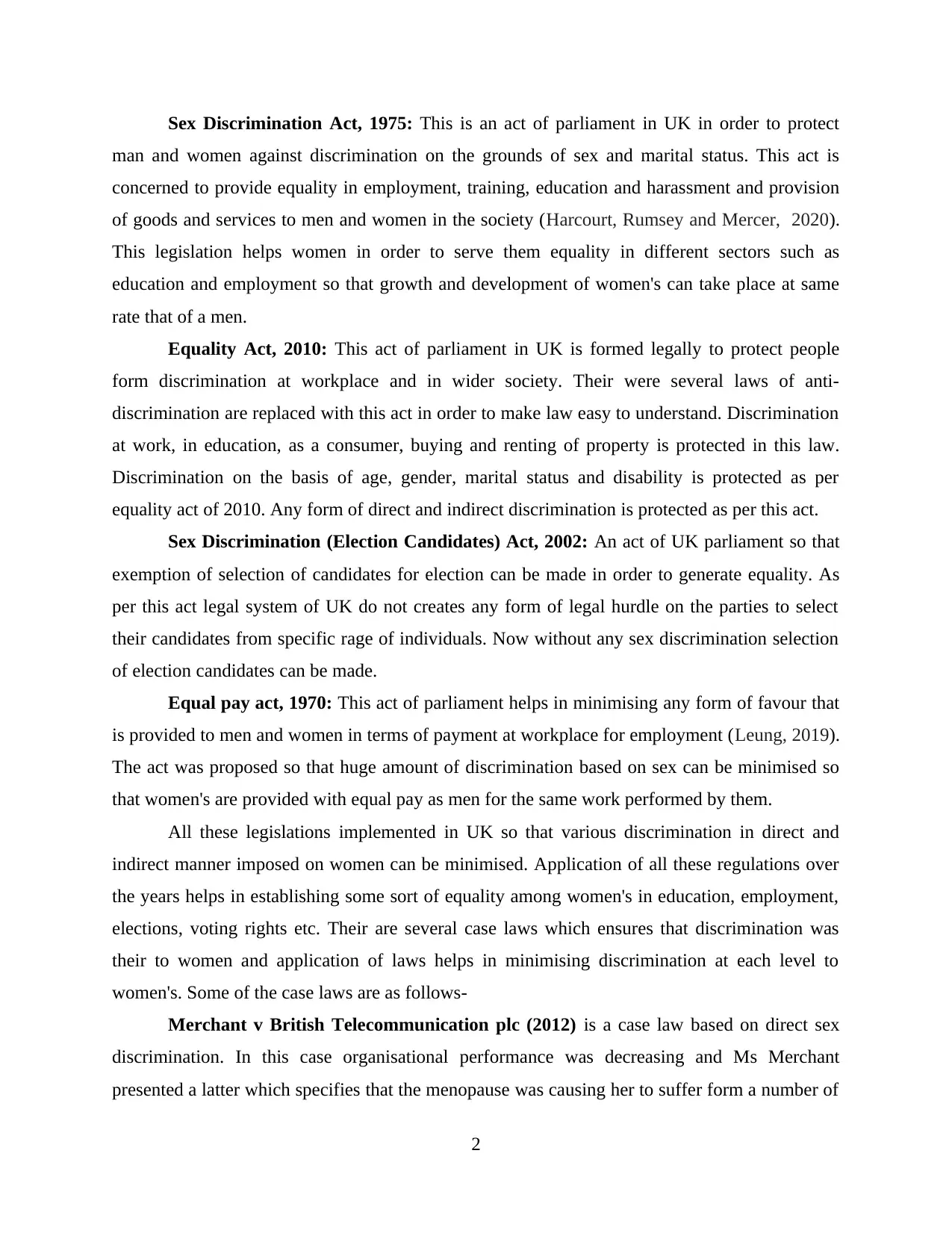
Sex Discrimination Act, 1975: This is an act of parliament in UK in order to protect
man and women against discrimination on the grounds of sex and marital status. This act is
concerned to provide equality in employment, training, education and harassment and provision
of goods and services to men and women in the society (Harcourt, Rumsey and Mercer, 2020).
This legislation helps women in order to serve them equality in different sectors such as
education and employment so that growth and development of women's can take place at same
rate that of a men.
Equality Act, 2010: This act of parliament in UK is formed legally to protect people
form discrimination at workplace and in wider society. Their were several laws of anti-
discrimination are replaced with this act in order to make law easy to understand. Discrimination
at work, in education, as a consumer, buying and renting of property is protected in this law.
Discrimination on the basis of age, gender, marital status and disability is protected as per
equality act of 2010. Any form of direct and indirect discrimination is protected as per this act.
Sex Discrimination (Election Candidates) Act, 2002: An act of UK parliament so that
exemption of selection of candidates for election can be made in order to generate equality. As
per this act legal system of UK do not creates any form of legal hurdle on the parties to select
their candidates from specific rage of individuals. Now without any sex discrimination selection
of election candidates can be made.
Equal pay act, 1970: This act of parliament helps in minimising any form of favour that
is provided to men and women in terms of payment at workplace for employment (Leung, 2019).
The act was proposed so that huge amount of discrimination based on sex can be minimised so
that women's are provided with equal pay as men for the same work performed by them.
All these legislations implemented in UK so that various discrimination in direct and
indirect manner imposed on women can be minimised. Application of all these regulations over
the years helps in establishing some sort of equality among women's in education, employment,
elections, voting rights etc. Their are several case laws which ensures that discrimination was
their to women and application of laws helps in minimising discrimination at each level to
women's. Some of the case laws are as follows-
Merchant v British Telecommunication plc (2012) is a case law based on direct sex
discrimination. In this case organisational performance was decreasing and Ms Merchant
presented a latter which specifies that the menopause was causing her to suffer form a number of
2
man and women against discrimination on the grounds of sex and marital status. This act is
concerned to provide equality in employment, training, education and harassment and provision
of goods and services to men and women in the society (Harcourt, Rumsey and Mercer, 2020).
This legislation helps women in order to serve them equality in different sectors such as
education and employment so that growth and development of women's can take place at same
rate that of a men.
Equality Act, 2010: This act of parliament in UK is formed legally to protect people
form discrimination at workplace and in wider society. Their were several laws of anti-
discrimination are replaced with this act in order to make law easy to understand. Discrimination
at work, in education, as a consumer, buying and renting of property is protected in this law.
Discrimination on the basis of age, gender, marital status and disability is protected as per
equality act of 2010. Any form of direct and indirect discrimination is protected as per this act.
Sex Discrimination (Election Candidates) Act, 2002: An act of UK parliament so that
exemption of selection of candidates for election can be made in order to generate equality. As
per this act legal system of UK do not creates any form of legal hurdle on the parties to select
their candidates from specific rage of individuals. Now without any sex discrimination selection
of election candidates can be made.
Equal pay act, 1970: This act of parliament helps in minimising any form of favour that
is provided to men and women in terms of payment at workplace for employment (Leung, 2019).
The act was proposed so that huge amount of discrimination based on sex can be minimised so
that women's are provided with equal pay as men for the same work performed by them.
All these legislations implemented in UK so that various discrimination in direct and
indirect manner imposed on women can be minimised. Application of all these regulations over
the years helps in establishing some sort of equality among women's in education, employment,
elections, voting rights etc. Their are several case laws which ensures that discrimination was
their to women and application of laws helps in minimising discrimination at each level to
women's. Some of the case laws are as follows-
Merchant v British Telecommunication plc (2012) is a case law based on direct sex
discrimination. In this case organisational performance was decreasing and Ms Merchant
presented a latter which specifies that the menopause was causing her to suffer form a number of
2
Secure Best Marks with AI Grader
Need help grading? Try our AI Grader for instant feedback on your assignments.
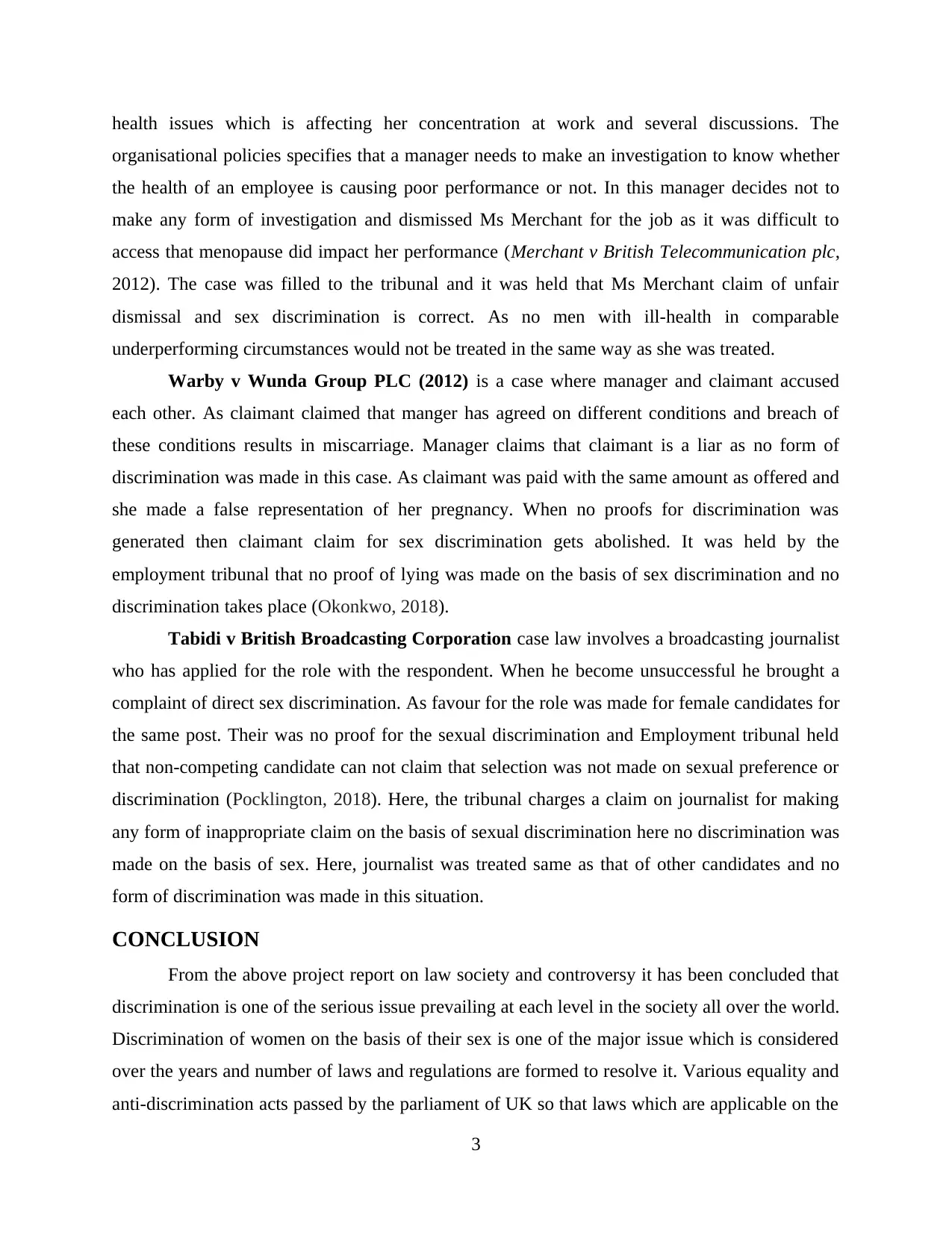
health issues which is affecting her concentration at work and several discussions. The
organisational policies specifies that a manager needs to make an investigation to know whether
the health of an employee is causing poor performance or not. In this manager decides not to
make any form of investigation and dismissed Ms Merchant for the job as it was difficult to
access that menopause did impact her performance (Merchant v British Telecommunication plc,
2012). The case was filled to the tribunal and it was held that Ms Merchant claim of unfair
dismissal and sex discrimination is correct. As no men with ill-health in comparable
underperforming circumstances would not be treated in the same way as she was treated.
Warby v Wunda Group PLC (2012) is a case where manager and claimant accused
each other. As claimant claimed that manger has agreed on different conditions and breach of
these conditions results in miscarriage. Manager claims that claimant is a liar as no form of
discrimination was made in this case. As claimant was paid with the same amount as offered and
she made a false representation of her pregnancy. When no proofs for discrimination was
generated then claimant claim for sex discrimination gets abolished. It was held by the
employment tribunal that no proof of lying was made on the basis of sex discrimination and no
discrimination takes place (Okonkwo, 2018).
Tabidi v British Broadcasting Corporation case law involves a broadcasting journalist
who has applied for the role with the respondent. When he become unsuccessful he brought a
complaint of direct sex discrimination. As favour for the role was made for female candidates for
the same post. Their was no proof for the sexual discrimination and Employment tribunal held
that non-competing candidate can not claim that selection was not made on sexual preference or
discrimination (Pocklington, 2018). Here, the tribunal charges a claim on journalist for making
any form of inappropriate claim on the basis of sexual discrimination here no discrimination was
made on the basis of sex. Here, journalist was treated same as that of other candidates and no
form of discrimination was made in this situation.
CONCLUSION
From the above project report on law society and controversy it has been concluded that
discrimination is one of the serious issue prevailing at each level in the society all over the world.
Discrimination of women on the basis of their sex is one of the major issue which is considered
over the years and number of laws and regulations are formed to resolve it. Various equality and
anti-discrimination acts passed by the parliament of UK so that laws which are applicable on the
3
organisational policies specifies that a manager needs to make an investigation to know whether
the health of an employee is causing poor performance or not. In this manager decides not to
make any form of investigation and dismissed Ms Merchant for the job as it was difficult to
access that menopause did impact her performance (Merchant v British Telecommunication plc,
2012). The case was filled to the tribunal and it was held that Ms Merchant claim of unfair
dismissal and sex discrimination is correct. As no men with ill-health in comparable
underperforming circumstances would not be treated in the same way as she was treated.
Warby v Wunda Group PLC (2012) is a case where manager and claimant accused
each other. As claimant claimed that manger has agreed on different conditions and breach of
these conditions results in miscarriage. Manager claims that claimant is a liar as no form of
discrimination was made in this case. As claimant was paid with the same amount as offered and
she made a false representation of her pregnancy. When no proofs for discrimination was
generated then claimant claim for sex discrimination gets abolished. It was held by the
employment tribunal that no proof of lying was made on the basis of sex discrimination and no
discrimination takes place (Okonkwo, 2018).
Tabidi v British Broadcasting Corporation case law involves a broadcasting journalist
who has applied for the role with the respondent. When he become unsuccessful he brought a
complaint of direct sex discrimination. As favour for the role was made for female candidates for
the same post. Their was no proof for the sexual discrimination and Employment tribunal held
that non-competing candidate can not claim that selection was not made on sexual preference or
discrimination (Pocklington, 2018). Here, the tribunal charges a claim on journalist for making
any form of inappropriate claim on the basis of sexual discrimination here no discrimination was
made on the basis of sex. Here, journalist was treated same as that of other candidates and no
form of discrimination was made in this situation.
CONCLUSION
From the above project report on law society and controversy it has been concluded that
discrimination is one of the serious issue prevailing at each level in the society all over the world.
Discrimination of women on the basis of their sex is one of the major issue which is considered
over the years and number of laws and regulations are formed to resolve it. Various equality and
anti-discrimination acts passed by the parliament of UK so that laws which are applicable on the
3
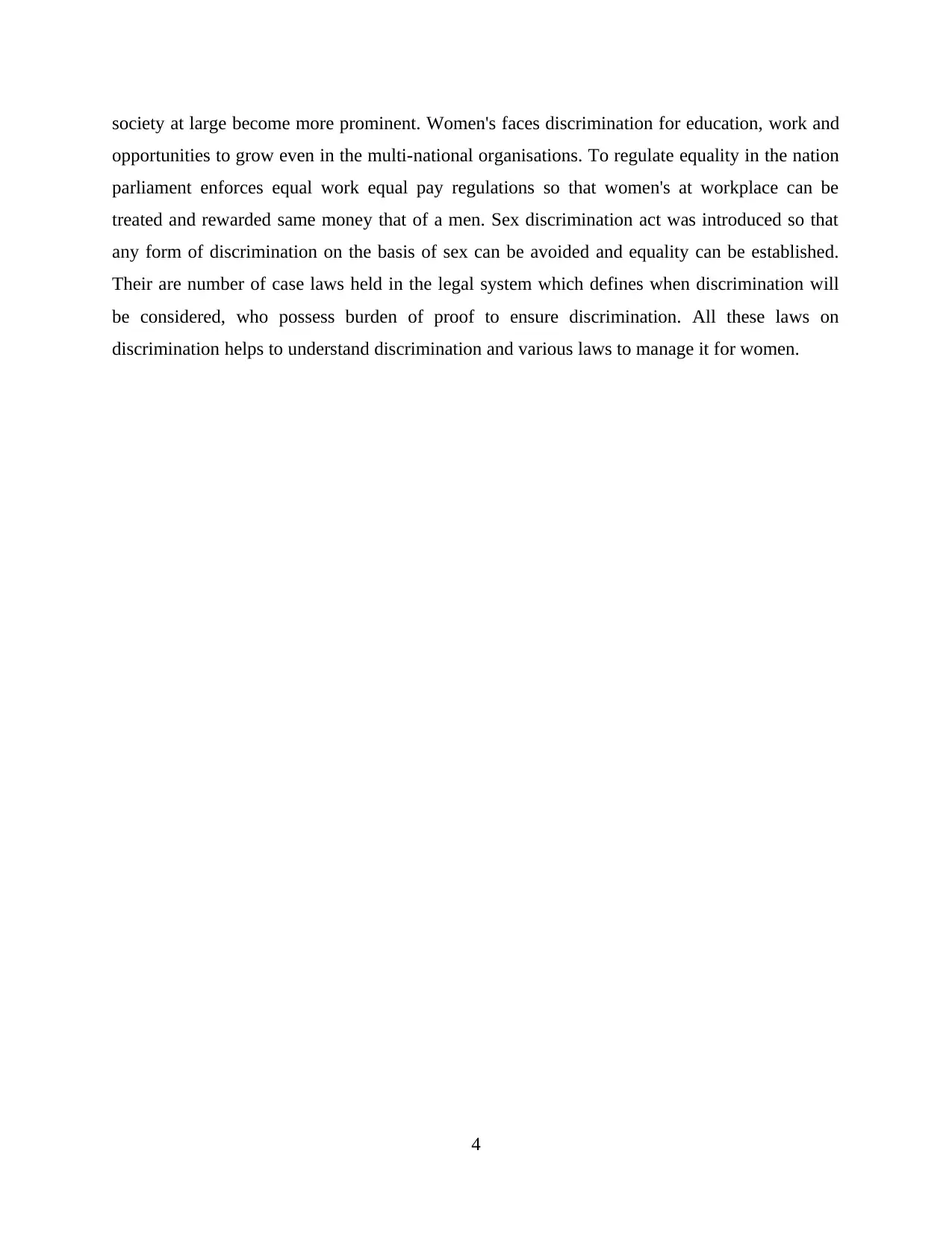
society at large become more prominent. Women's faces discrimination for education, work and
opportunities to grow even in the multi-national organisations. To regulate equality in the nation
parliament enforces equal work equal pay regulations so that women's at workplace can be
treated and rewarded same money that of a men. Sex discrimination act was introduced so that
any form of discrimination on the basis of sex can be avoided and equality can be established.
Their are number of case laws held in the legal system which defines when discrimination will
be considered, who possess burden of proof to ensure discrimination. All these laws on
discrimination helps to understand discrimination and various laws to manage it for women.
4
opportunities to grow even in the multi-national organisations. To regulate equality in the nation
parliament enforces equal work equal pay regulations so that women's at workplace can be
treated and rewarded same money that of a men. Sex discrimination act was introduced so that
any form of discrimination on the basis of sex can be avoided and equality can be established.
Their are number of case laws held in the legal system which defines when discrimination will
be considered, who possess burden of proof to ensure discrimination. All these laws on
discrimination helps to understand discrimination and various laws to manage it for women.
4
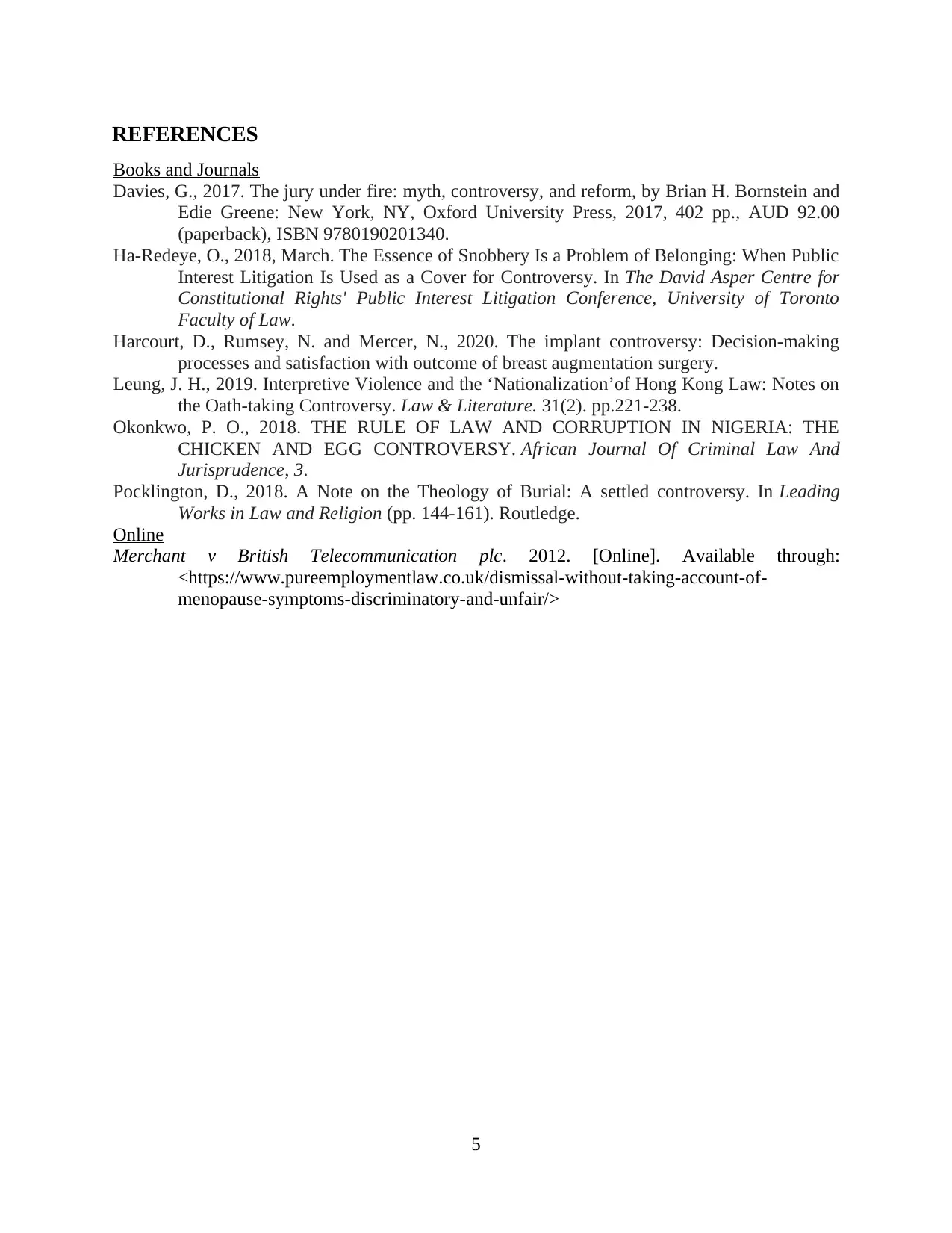
REFERENCES
Books and Journals
Davies, G., 2017. The jury under fire: myth, controversy, and reform, by Brian H. Bornstein and
Edie Greene: New York, NY, Oxford University Press, 2017, 402 pp., AUD 92.00
(paperback), ISBN 9780190201340.
Ha-Redeye, O., 2018, March. The Essence of Snobbery Is a Problem of Belonging: When Public
Interest Litigation Is Used as a Cover for Controversy. In The David Asper Centre for
Constitutional Rights' Public Interest Litigation Conference, University of Toronto
Faculty of Law.
Harcourt, D., Rumsey, N. and Mercer, N., 2020. The implant controversy: Decision-making
processes and satisfaction with outcome of breast augmentation surgery.
Leung, J. H., 2019. Interpretive Violence and the ‘Nationalization’of Hong Kong Law: Notes on
the Oath-taking Controversy. Law & Literature. 31(2). pp.221-238.
Okonkwo, P. O., 2018. THE RULE OF LAW AND CORRUPTION IN NIGERIA: THE
CHICKEN AND EGG CONTROVERSY. African Journal Of Criminal Law And
Jurisprudence, 3.
Pocklington, D., 2018. A Note on the Theology of Burial: A settled controversy. In Leading
Works in Law and Religion (pp. 144-161). Routledge.
Online
Merchant v British Telecommunication plc. 2012. [Online]. Available through:
<https://www.pureemploymentlaw.co.uk/dismissal-without-taking-account-of-
menopause-symptoms-discriminatory-and-unfair/>
5
Books and Journals
Davies, G., 2017. The jury under fire: myth, controversy, and reform, by Brian H. Bornstein and
Edie Greene: New York, NY, Oxford University Press, 2017, 402 pp., AUD 92.00
(paperback), ISBN 9780190201340.
Ha-Redeye, O., 2018, March. The Essence of Snobbery Is a Problem of Belonging: When Public
Interest Litigation Is Used as a Cover for Controversy. In The David Asper Centre for
Constitutional Rights' Public Interest Litigation Conference, University of Toronto
Faculty of Law.
Harcourt, D., Rumsey, N. and Mercer, N., 2020. The implant controversy: Decision-making
processes and satisfaction with outcome of breast augmentation surgery.
Leung, J. H., 2019. Interpretive Violence and the ‘Nationalization’of Hong Kong Law: Notes on
the Oath-taking Controversy. Law & Literature. 31(2). pp.221-238.
Okonkwo, P. O., 2018. THE RULE OF LAW AND CORRUPTION IN NIGERIA: THE
CHICKEN AND EGG CONTROVERSY. African Journal Of Criminal Law And
Jurisprudence, 3.
Pocklington, D., 2018. A Note on the Theology of Burial: A settled controversy. In Leading
Works in Law and Religion (pp. 144-161). Routledge.
Online
Merchant v British Telecommunication plc. 2012. [Online]. Available through:
<https://www.pureemploymentlaw.co.uk/dismissal-without-taking-account-of-
menopause-symptoms-discriminatory-and-unfair/>
5
1 out of 7
Related Documents
Your All-in-One AI-Powered Toolkit for Academic Success.
+13062052269
info@desklib.com
Available 24*7 on WhatsApp / Email
![[object Object]](/_next/static/media/star-bottom.7253800d.svg)
Unlock your academic potential
© 2024 | Zucol Services PVT LTD | All rights reserved.





